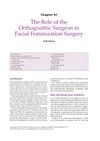
Search
for
Sort by
Research
150-180 / 1000+ results

research Chapter 1: Facial Feminization Surgery: A Global Approach
The document recommends a multidisciplinary approach and experience sharing to advance facial feminization surgery as a medical field.

research The Role of the Orthognathic Surgeon in Facial Feminization Surgery
Orthognathic surgeons play a key role in modifying masculine facial features to be more feminine, often improving transgender women's quality of life.

research Responses of Type II Spiral Ganglion Neurites to Stripes of Laminin and Fibronectin
Type II spiral ganglion neurites avoid high concentrations of laminin and fibronectin.

research Innovations in Chemotherapy and Radiation Therapy: Implications and Opportunities for the Asia-Pacific Rim
New cancer treatments are more precise and less toxic, improving survival rates, but Asia faces challenges in adopting these advancements.

research Hair Deformities: Treatment Through Hair Restoration Surgery
Hair restoration surgery techniques can effectively treat scalp deformities and have evolved to provide natural-looking results.

research Disorders of Hair in Children
The document concludes that accurate diagnosis and understanding the type of hair disorder are crucial for treating hair loss in children.

research Cutaneous Manifestations of Systemic Infection in Children
Skin symptoms are important for diagnosing infections in children.

research The Nuts and Bolts of Low-Level Laser Therapy
Low-level Laser Therapy may help reduce inflammation, pain, and aid healing, but more research is needed to confirm its effectiveness and establish standard treatment guidelines.

research Admixture in Latin America: Geographic Structure, Phenotypic Diversity, and Self-Perception of Ancestry Based on 7,342 Individuals
The study found that in Latin America, ancestry varies by location, influences physical traits, and affects how people perceive their own heritage.

research Skin Wound Healing in Humans and Mice: Challenges in Translational Research
The document concludes that mouse models are helpful but have limitations for skin wound healing research, and suggests using larger animals and genetically modified mice for better human application.

research Transforming Growth Factor-Beta in Stem Cells and Tissue Homeostasis
TGF-β is crucial for tissue repair and can cause diseases if not properly regulated.

research Cerebellar Medulloblastoma: Treatment by Irradiation of the Whole Central Nervous System
Radiation therapy with a higher dose for the brain improves survival in cerebellar medulloblastoma.

research Genetic Variation at the MC1R Locus and the Time Since Loss of Human Body Hair
Humans lost body hair relatively recently in evolution.

research Vitamin D and the Skin: Focus on a Complex Relationship
Vitamin D is important for skin health and may affect conditions like psoriasis and hair loss, but more research is needed to understand its role fully.

research Wnt Signaling Regulates Symmetry of Division of Neural Stem Cells in the Adult Brain and in Response to Injury
Wnt signaling helps control how brain stem cells divide and is important for brain repair after injury.

research Coats' Plus: A Progressive Familial Syndrome of Bilateral Coats' Disease, Characteristic Cerebral Calcification, Leukoencephalopathy, Slow Pre- and Post-Natal Linear Growth, and Defects of Bone Marrow and Integument
Coats' Plus is a genetic disorder with eye abnormalities, brain calcification, poor growth, bone and skin issues, and movement disorders.

research The Logic of Follicular Unit Transplantation
The document concludes that follicular unit transplantation offers more natural results and better graft survival than older hair transplant methods.

research Alopecia Areata: An Evidence-Based Treatment Update
Some treatments, like corticosteroids and sensitizing agents, can help with alopecia areata, but more high-quality research is needed.

research Systematic Review: Adipose-Derived Mesenchymal Stem Cells, Platelet-Rich Plasma, and Biomaterials as New Regenerative Strategies in Chronic Skin Wounds and Soft Tissue Defects
Fat-derived stem cells, platelet-rich plasma, and biomaterials show promise for healing chronic skin wounds and improving soft tissue with few side effects.

research Platelet Preparations for Use in Facial Rejuvenation and Wound Healing: A Critical Review of Current Literature
Platelet preparations generally show positive effects on wound healing and facial rejuvenation, but more thorough research is needed to confirm their effectiveness.

research Menstrual Irregularity in Women with Acromegaly
Women with acromegaly often have irregular periods due to hormone imbalances and growth hormone effects.

research Finasteride Blocks the Reduction in Ictal Activity Produced by Exogenous Estrous Cyclicity

research Novel Therapeutic Approaches in Utilizing Platelet Lysate in Regenerative Medicine: Are We Ready for Clinical Use?
Platelet lysate is a promising, cost-effective option for regenerative medicine with potential clinical applications.

research Studies of Normal Moult and Artificially Induced Regeneration of Pelage in Peromyscus
Artificially inducing hair regrowth in mice can change the normal pattern and timing of hair growth, with minimal color differences between old and new fur.

research Progesterone Enhances Ethanol-Induced Modulation of Mesocortical Dopamine Neurons: Antagonism by Finasteride
Progesterone boosts alcohol's effect on brain, finasteride counters it.

research Assessment of Hair Loss: Clinical Relevance of Hair Growth Evaluation Methods
Effective hair loss assessment requires a mix of precise measurement methods.

research Assessment of the Usefulness of Dihydrotestosterone in the Diagnostics of Patients with Androgenetic Alopecia
DHT's role in hair loss is important, but measuring its level for diagnosis is questionable.

research Follicular and Scarring Disorders in Skin of Color: Presentation and Management
The conclusion is that better understanding and more research are needed to effectively manage follicular and scarring disorders in skin of color, with an emphasis on patient education and cultural awareness.

research Familial Nonmembranous Aplasia Cutis of the Scalp
Some families have a genetic condition where they are born with irregular scalp defects.